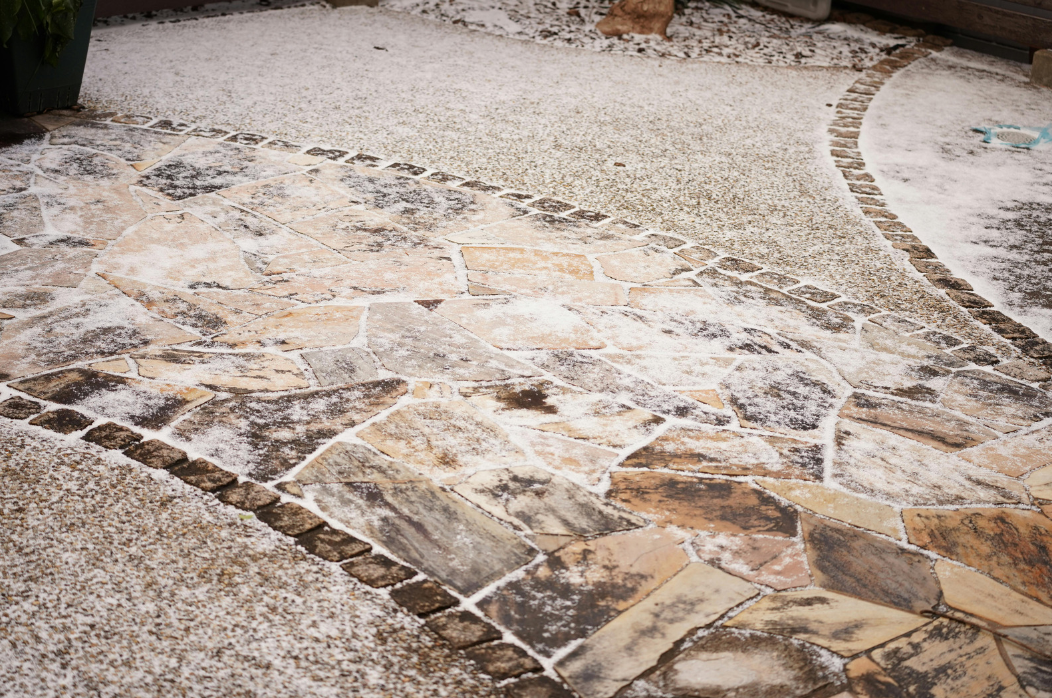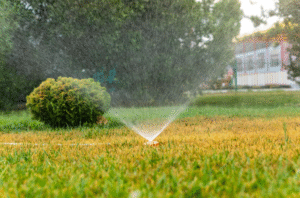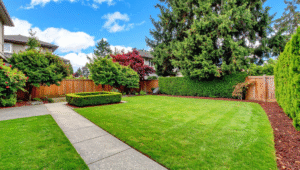Choosing the right hardscape materials is one of the most important parts of creating a patio or walkway that lasts. The material you select affects how your space looks, feels, and performs over time. With Utah’s mix of hot summers, cold winters, and occasional snow, durability and maintenance matter just as much as style. This guide breaks down the most popular patio and walkway materials, their pros and cons, and how to choose the best one for your home.
Why the Right Material Matters
Patios and walkways do more than connect spaces. They define your outdoor living area. The right surface can handle daily use, resist weather damage, and add long-term value to your property. When choosing materials, consider cost, maintenance, and how well each option fits your overall design.
Concrete: Practical and Versatile
Concrete is one of the most common choices for patios and walkways because it’s affordable and flexible in design. It can be poured into any shape and finished with textures or colors to suit your style. Homeowners can even stamp it to mimic the look of stone or tile.
Pros: Strong, affordable, and low maintenance.
Cons: Can crack with freeze-thaw cycles if not sealed properly.
Concrete works best for large patios or walkways where cost efficiency and long life are priorities. Regular sealing keeps it looking new and prevents moisture damage through the seasons.
Natural Stone: Classic and Long-Lasting
If you want a high-end, natural look, stone is unmatched. Flagstone, slate, and limestone are popular for their rich textures and unique patterns. Each piece has its own color variations, creating a surface that feels timeless and sophisticated.
Pros: Extremely durable, natural beauty, and great resale value.
Cons: Higher cost and heavier installation.
Natural stone is ideal for Utah homeowners who want a long-term investment and appreciate a rustic or elegant design. It performs well in both hot and cold climates when installed with proper drainage.
Brick Pavers: Traditional and Dependable
Brick pavers bring a classic style that fits many architectural designs. Their uniform shape makes them easy to replace individually if damage occurs. Pavers are also slip-resistant and work well in both shaded and sunny areas.
Pros: Easy to repair, visually appealing, slip-resistant.
Cons: Can shift or settle if the base isn’t prepared correctly.
To reduce movement and weeds between joints, apply polymeric sand and reseal every few years. Brick patios and walkways suit homeowners who prefer warm tones and timeless designs.
Gravel and Crushed Stone: Simple and Budget-Friendly
For informal paths or garden walkways, gravel is an affordable and natural choice. It allows rainwater to drain easily, making it environmentally friendly and low impact. Crushed stone or pea gravel is also quick to install compared to concrete or stone.
Pros: Low cost, excellent drainage, easy to install.
Cons: Shifts under heavy use and needs frequent raking or topping off.
Gravel fits best in casual landscapes or secondary paths where a relaxed, natural feel is preferred. For better stability, use edging materials to keep stones contained.
Porcelain Pavers: Modern and Durable
Porcelain pavers offer a sleek, contemporary look with impressive performance. They resist fading, cracking, and staining even under extreme weather. Their uniform color and clean finish make them perfect for modern homes or poolside patios.
Pros: Weather-resistant, easy to clean, fade-proof.
Cons: Higher upfront cost and can be slippery when wet if not textured.
Porcelain is ideal for homeowners who want minimal maintenance and a polished design that stays consistent over time.
Stamped Concrete: Custom Look for Less
Stamped concrete delivers the beauty of stone or brick without the higher price tag. Patterns and color pigments are pressed into wet concrete to imitate premium materials. When sealed correctly, it can handle heavy use while maintaining its appearance for years.
Pros: Affordable, highly customizable, durable.
Cons: Needs resealing and can be difficult to repair if cracks form.
Stamped concrete works well for patios that need character and texture without exceeding the budget.
Retaining Wall Blocks: Support and Structure
If your yard includes slopes or elevation changes, retaining wall blocks add both strength and style. Concrete blocks come in a variety of textures and colors, from smooth modern finishes to rough-cut stone looks. These walls prevent erosion, create seating areas, or form raised planting beds.
Pros: Long-lasting, low maintenance, structural stability.
Cons: Requires correct drainage behind walls to avoid shifting.
Retaining walls tie together your patio and walkway designs, helping shape the overall landscape while keeping soil in place.
Comparing Concrete and Stone Patios
Homeowners often decide between concrete and stone when planning new patios. Concrete is the practical choice. It is cost-effective, customizable, and quick to install. Stone, however, offers a more natural and upscale finish with decades of durability. The decision depends on your priorities: budget and simplicity versus appearance and longevity.
If you want a balance of both, consider combining materials. For example, use a concrete base framed by natural stone borders or add a small flagstone walkway beside a poured concrete patio. This mix can reduce costs while maintaining a high-end look.
Tips for Choosing the Right Material
When selecting hardscape materials, consider the following factors before committing.
- Climate: Choose materials that handle freeze-thaw cycles without cracking.
- Budget: Account for installation and sealing, not just material cost.
- Maintenance: Concrete and porcelain require less care than stone or gravel.
- Design Style: Match colors and textures to your home’s architecture.
- Durability: If you expect heavy use, pick high-strength pavers or stone.
Plan with Confidence
The best patios and walkways combine function, durability, and design. Understanding the benefits and trade-offs of each material helps you plan confidently and avoid expensive mistakes later. When you are ready to build, a professional can help compare costs, choose the right retaining wall block types, and ensure proper installation for long-term results.
Ready to start planning your outdoor project?
Contact Aridscape Utah to explore the best hardscape materials for your patio or walkway. Their experienced team can guide you through design options, material comparisons, and installation that fit your home, climate, and style.



